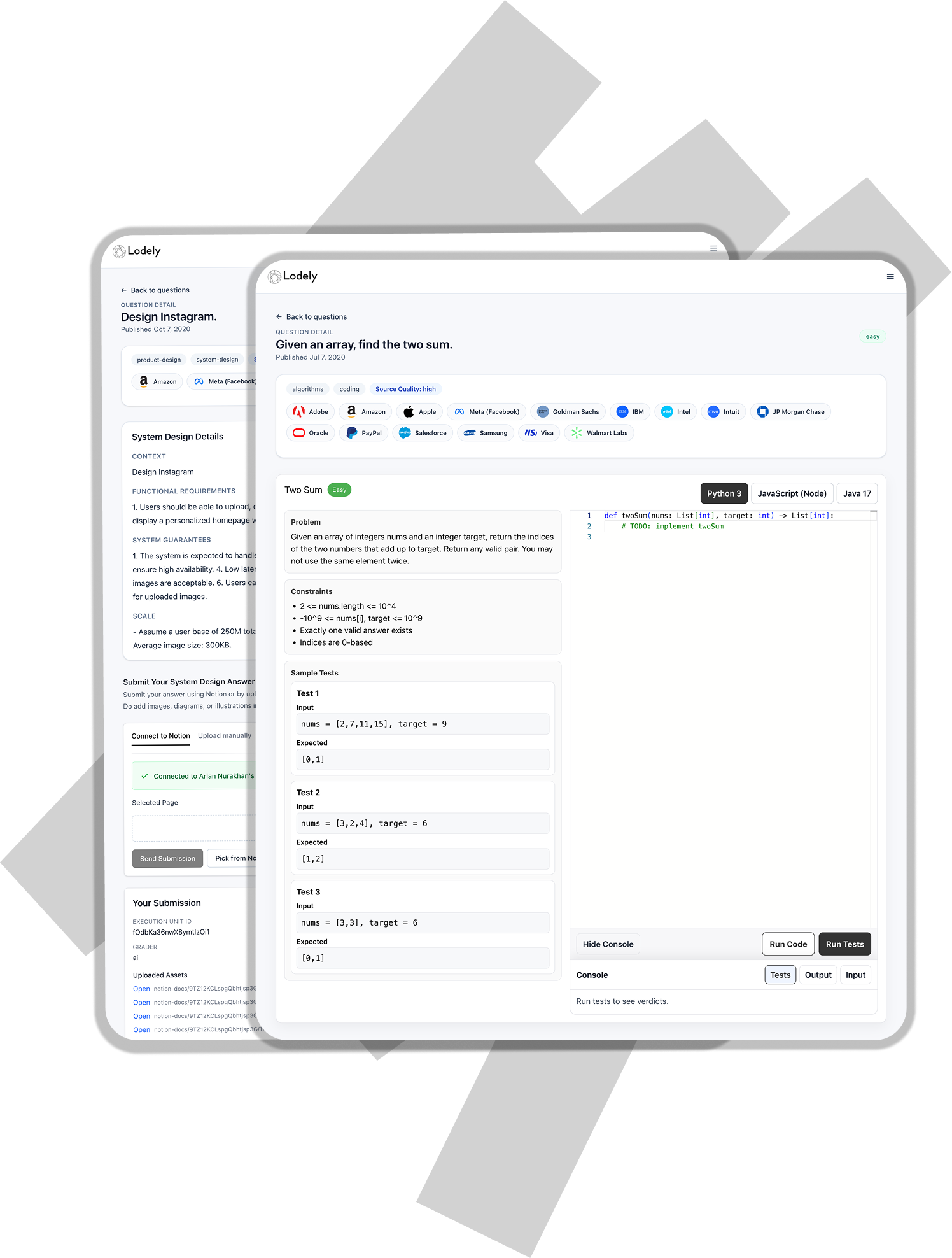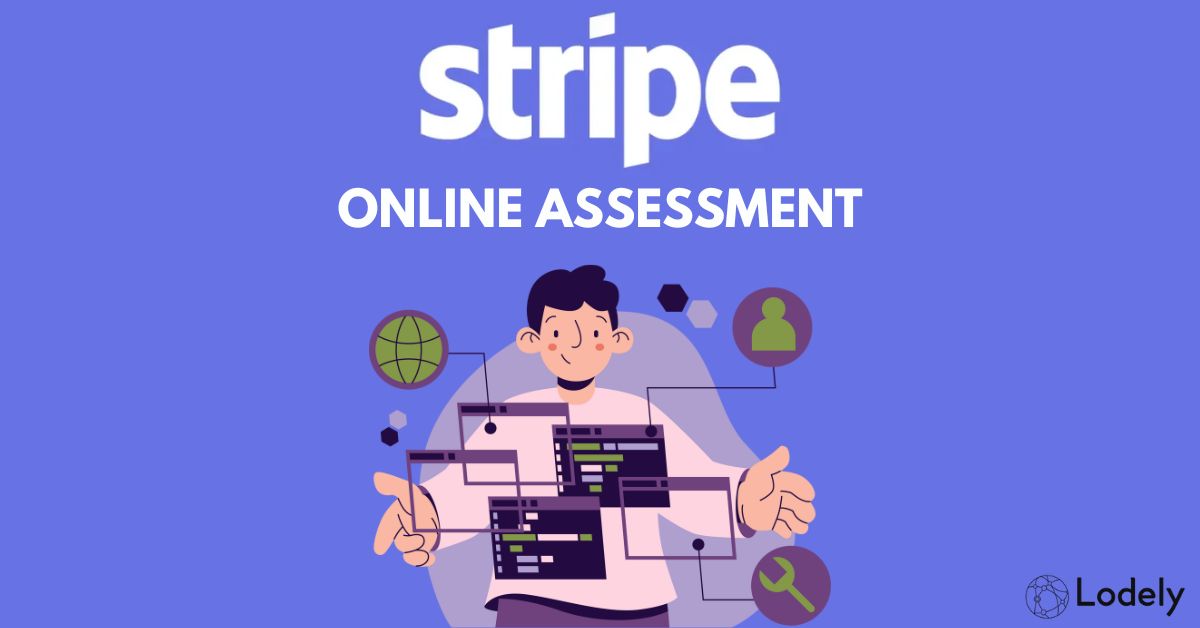Automation Testing Career Growth Explained: Is It a Good Career in 2025?
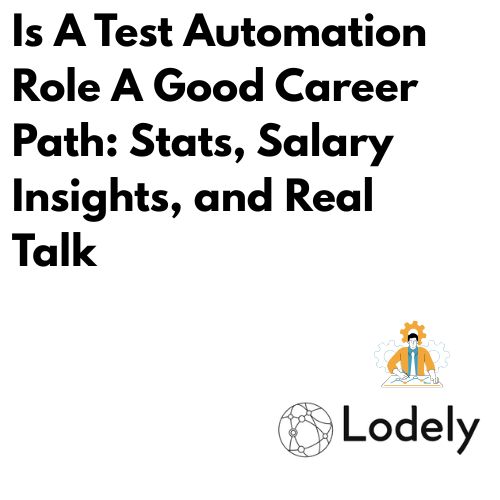
Automation Testing Career Growth Explained: Is It a Good Career in 2025?
Most people assume test automation is just another flavor of QA until they realize how deep the rabbit hole actually goes. Between the tooling, salaries, skill expectations, and shifting industry demand, it’s easy to misjudge what this role offers.
That’s why I’m unpacking the full story behind a question I get more than you'd think: Is a test automation role a good career path, or just overhyped noise?
The Test Automation Career Path: What They Don't Tell You
You're probably here because you've heard about test automation engineers making a good living and wondering if it's worth pursuing. I get it - the tech industry is full of shiny career paths that promise the world but don't always deliver.
Having worked across different areas of tech and seeing friends transition into automation roles, I can tell you that test automation is one of the most solid career moves you can make right now. But let me break down the real numbers and insider knowledge so you can make an informed decision.
The Market is Literally Screaming for Automation Engineers
Here's something that blew my mind when I first learned about it: 88% of companies struggle to find, hire, and retain quality testing and automation support engineers. That's not a typo. Almost 9 out of 10 companies can't find the talent they need.
What does this mean for you? Massive leverage in salary negotiations and job security.
The demand is classified as "Very High" - Essential for modern software development according to industry reports, with a 14% annual growth rate expected going forward. Compare that to the general tech job market, and you'll see why smart engineers are pivoting into automation.
tldr: If you can code and understand testing fundamentals, companies will fight over you.
The Money is Insane (When You Know Where to Look)
Let's talk numbers because that's what matters, right?
The average annual salary for an automation test engineer is $105,445 according to Glassdoor. But here's where it gets interesting – that's just the average. The real range is much wider.
Salary breakdown by experience:
- Entry-level (0-2 years): $97,500 average annually
- Mid-level (2-4 years): $116,221 average annually
- Advanced (5-7 years): $154,077 average annually
And if you want to think hourly, we're looking at $51.28 per hour on average, with ranges from $44.23 to $58.41 (25th to 75th percentile).
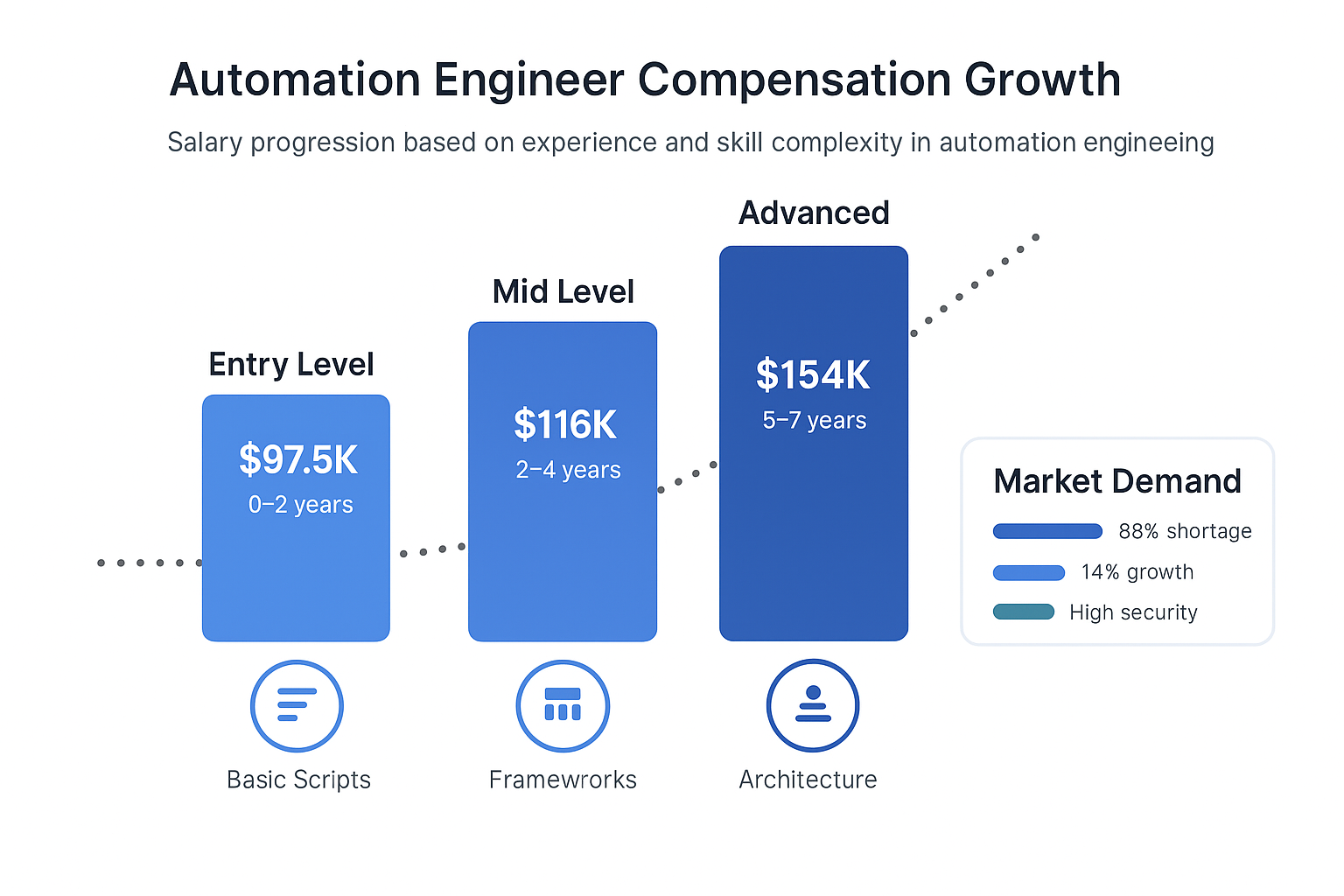
But here's the kicker: these are just base salaries. In my experience, the real money is in the equity and bonuses, especially if you land at a high-growth company that values quality engineering.
This Industry is Exploding (And It's Not Slowing Down)
Remember how I mentioned market dynamics in my other posts? Well, automation testing is riding one hell of a wave.
The global automation testing market is expected to grow from USD 20.7 billion in 2021 to USD 49.9 billion by 2026, at a CAGR of 19.2%. That's more than doubling in 5 years.
What's driving this? Simple, companies can't afford to ship buggy software anymore. User expectations are through the roof, and manual testing simply doesn't scale. I've seen teams where 26% are replacing up to 50% of their manual testing efforts with automation, and 20% are replacing 75% or more.
The writing is on the wall; automation isn't just nice to have anymore, it's essential for survival.
Career Growth That Makes Sense
One thing I love about automation roles is the clear progression path. Unlike some tech roles where advancement is murky, automation has a well-defined ladder:
- Junior Test Automation Engineer (0-2 years) → Learning the ropes, basic script development
- Test Automation Engineer (2-5 years) → Independent project handling, framework building
- Senior Automation Engineer/Lead (5-8 years) → Architecting solutions, mentoring teams
- QA Automation Architect (8+ years) → Strategic planning, cross-company initiatives
Plus, there's massive flexibility. You can work in literally any industry – fintech, healthcare, e-commerce, gaming. Remote work adoption is strong in this field too, so you're not tied to Silicon Valley if you don't want to be.
Your Skills Won't Become Obsolete Tomorrow
Here's something that keeps me up at night about some tech roles - will this still be relevant in 5 years? With automation, the answer is a resounding yes.
Integration with DevOps is exploding - 51.8% of teams adopted DevOps by 2024, up from just 16.9% in 2022. And guess what DevOps needs? Rock-solid automated testing.
Even cooler, AI testing adoption increased from 7% in 2023 to 16% in 2025. Instead of AI replacing automation engineers, it's making them more powerful. You're not competing with AI, you're leveraging it.
Yes, test automation is an absolutely killer career path. The demand is insane, the pay is excellent, the growth trajectory is clear, and your skills will remain relevant.
But here's the thing - like any good opportunity, it requires genuine interest in the craft. You'll be debugging flaky tests, building frameworks, and thinking deeply about software quality. If you're just in it for the money without enjoying the problem-solving aspect, you'll burn out.
How to Break Into Test Automation (Your 90-Day Game Plan)
Alright, so you're convinced that test automation is worth pursuing, but now you're staring at the "how the hell do I get started" problem. I get it - the field seems intimidating from the outside, especially if you're coming from a non-technical background.
Here's the thing: I've watched complete beginners land their first automation roles in 3-6 months by following a structured approach. Not because they were geniuses, but because they had a clear roadmap and stuck to it.
Let me give you the exact blueprint that works, one that even a technical career coach would sign off on, based on what I’ve seen succeed in the real world.
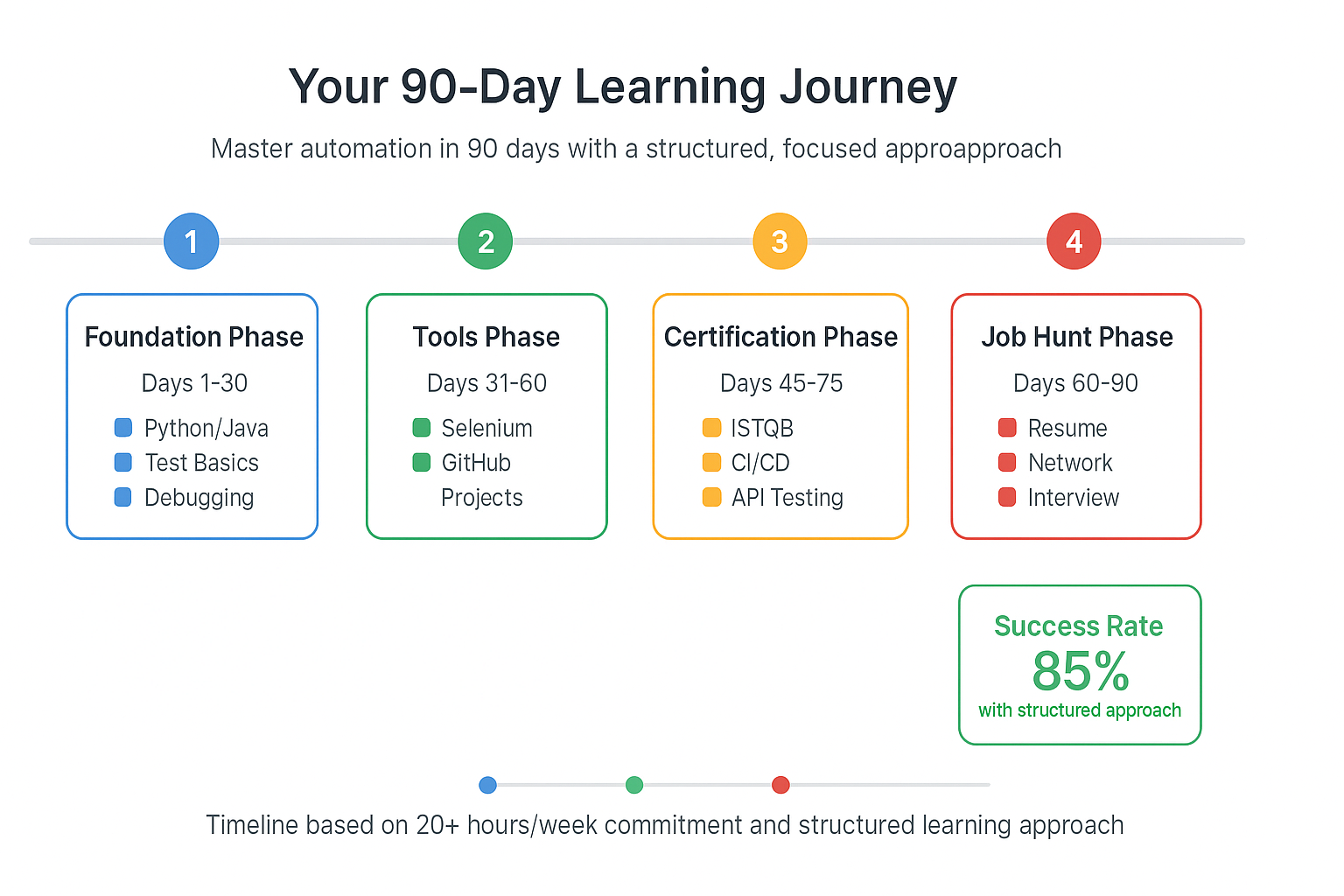
The Foundation Phase (Days 1-30): Build Your Base
This is where most people either build momentum or give up. Get this right and everything else flows naturally.
Pick Your Programming Language (And Stick With It)
Start with Python or Java. Period. Don't overthink this decision.
Why Python? It's beginner-friendly, has massive community support, and is used by most modern automation frameworks. Plus, if you mess up syntax, Python won't punish you as harshly as other languages.
Why Java? Still the most requested language in automation job postings, especially at enterprise companies. If you're targeting big corp roles, Java gives you an edge.
My recommendation: Go with Python unless you specifically want to work at large enterprises. The learning curve is gentler, and you'll build confidence faster.
Master the Fundamentals (No Shortcuts)
Week 1-2: Programming Basics
- Variables, loops, conditionals, functions
- Data structures (lists, dictionaries, objects)
- Error handling and debugging
Week 3-4: Testing Concepts
- What is software testing, and why does it matter
- Manual vs automated testing differences
- Test case design and execution
Free resources that work:
- Python.org's official tutorial - boring but thorough
- Automate the Boring Stuff with Python - practical and engaging
- Test Automation University by Applitools - industry-specific courses
tldr: Don't rush this phase. A solid foundation saves you months of frustration later.
The Tools Phase (Days 31-60): Get Your Hands Dirty
Now comes the fun part. You'll go from writing basic scripts to building actual automation frameworks that solve real problems.
Learn Selenium (Your Bread and Butter)
Selenium is still the king of web automation, despite newer tools like Playwright gaining traction. Why start here? Because 70% of job postings still mention Selenium, and the concepts transfer to other tools easily.
Week 1: Selenium Basics
- Setting up WebDriver
- Finding elements on web pages
- Basic interactions (click, type, scroll)
- Writing your first automated test
Week 2: Intermediate Selenium
- Handling different browsers
- Working with forms and dropdowns
- Managing wait conditions (this is huge – most beginners screw this up)
- Taking screenshots for debugging
Week 3-4: Real Projects
Here's where most tutorials fail you. Instead of toy examples, automate something you use:
- Log into your bank account and check your balance
- Automate your LinkedIn job search
- Create tests for your favorite e-commerce site
Pro tip: Start with sites you know well. You'll understand the expected behavior better, making it easier to write meaningful tests.
Build Your GitHub Portfolio (This is Critical)
Your GitHub is your resume in automation. Recruiters will check it, and an empty profile is a red flag.
What to include:
- 3-5 automation projects with clear README files
- Different types of testing: web UI, API, mobile (if possible)
- Clean, commented code that shows your thought process
- Test reports and screenshots of your automation in action
Project ideas that impressed hiring managers:
- E-commerce checkout flow automation
- API testing for a public service (like weather or stock APIs)
- Cross-browser testing framework
- Data-driven test suite using CSV/Excel files
The Certification and Learning Phase (Days 45-75): Build Credibility
Time to add some official credentials to your resume and learn the advanced stuff that separates professionals from hobbyists.
Certifications That Matter
ISTQB Foundation Level - The industry standard. Not exciting, but it shows you understand testing fundamentals. Cost: ~$200-300
Test Automation University certificates - Free and practical. Complete 3-4 courses relevant to your target role.
Vendor-specific certs (Selenium, Appium) - Less critical but good for resume keywords.
My take: Certifications won't get you hired by themselves, but they help you pass the initial screening and show commitment to the field.
Level Up Your Skills
Advanced topics to tackle:
- CI/CD integration – Learn to run tests in Jenkins or GitHub Actions
- API testing – Use tools like Postman or REST Assured
- Test frameworks – Understand TestNG (Java) or pytest (Python)
- Reporting – Generate test reports that stakeholders want to read
Learning platforms worth paying for:
- Udemy – Practical, project-based courses ($10-50 during sales)
- Pluralsight – More structured, enterprise-focused content
- LinkedIn Learning – Good for filling specific skill gaps
The Job Hunt Phase (Days 60-90): Land That First Role
This is where theory meets reality. You'll apply everything you've learned to convince someone to pay you for your automation skills.
Target the Right Opportunities
Don't aim for Netflix on day one. Target companies where you can grow:
- Startups that need generalists
- Mid-size companies building their automation practice
- Consulting firms that value diverse backgrounds
Job titles to search for:
- Junior QA Automation Engineer
- Test Automation Engineer (Entry Level)
- Software QA Engineer
- Automation Test Developer
Ace the Technical Interview
Common automation interview questions:
- "Walk me through how you'd automate testing this website."
- "How do you handle flaky tests?"
- "What's the difference between implicit and explicit waits?"
- "How would you test a login page?"
Preparation strategy:
- Practice coding problems – basic string manipulation, array handling
- Build a demo project you can screen-share during interviews
- Prepare stories about challenges you overcame in your projects.
The Network Effect (This is Huge)
Most automation jobs are filled through referrals. Start building relationships:
- Join testing communities – Ministry of Testing, Test Guild forums
- Attend virtual meetups – Selenium user groups, local QA meetups
- Connect with automation engineers on LinkedIn (but don't immediately ask for jobs)
Message template that works: "Hi [Name], I'm transitioning into test automation and really admired your post about [specific topic]. Would love to learn about your experience in the field. Any advice for someone just starting out?"
The Brutal Truth: Why Test Automation Will Drive You Crazy (And How to Stay Sane)
Look, I've been honest about the upsides of test automation, but I'd be doing you a disservice if I didn't tell you about the stuff that'll make you want to throw your laptop out the window.
Because here's the thing - every automation engineer I know has had those days where they question their life choices. Let me save you some pain by telling you exactly what you're getting into.
Flaky Tests Will Ruin Your Week
The biggest source of automation engineer misery? Tests that work fine on Monday and mysteriously fail on Tuesday for no apparent reason.
I've watched senior engineers spend entire days debugging a test that passed 100 times in a row, then suddenly started failing because of a 0.2-second timing issue. It's maddening.
Why does this happen?
- Network hiccups during test execution
- Browser rendering inconsistencies
- Race conditions you didn't anticipate
- Third-party services are going down mid-test
tldr: You'll become good at explaining to your manager why "it worked on my machine" isn't just an excuse.
The Maintenance Nightmare
Here's what no one tells you: writing the automation is the easy part. Maintaining it is where the real work begins.
Every time developers change the UI, your tests break. Every browser update? More broken tests. New feature release? You guessed it – more broken tests.
I've seen automation suites that took 6 months to build become completely unusable after a single application redesign. The maintenance overhead can easily consume 40-50% of your time.
The Learning Curve is Steeper Than You Think
You need to be part programmer, part tester, part system administrator, and part detective. That's a lot of hats to wear.
Most beginners underestimate the time investment. You're not just learning one tool, you're learning:
- Programming fundamentals
- Testing methodologies
- CI/CD pipelines
- Browser developer tools
- Debugging techniques
- Network protocols
Reality check: Plan for 6-12 months to feel genuinely competent, not the "3 months to automation expert" that some courses promise.
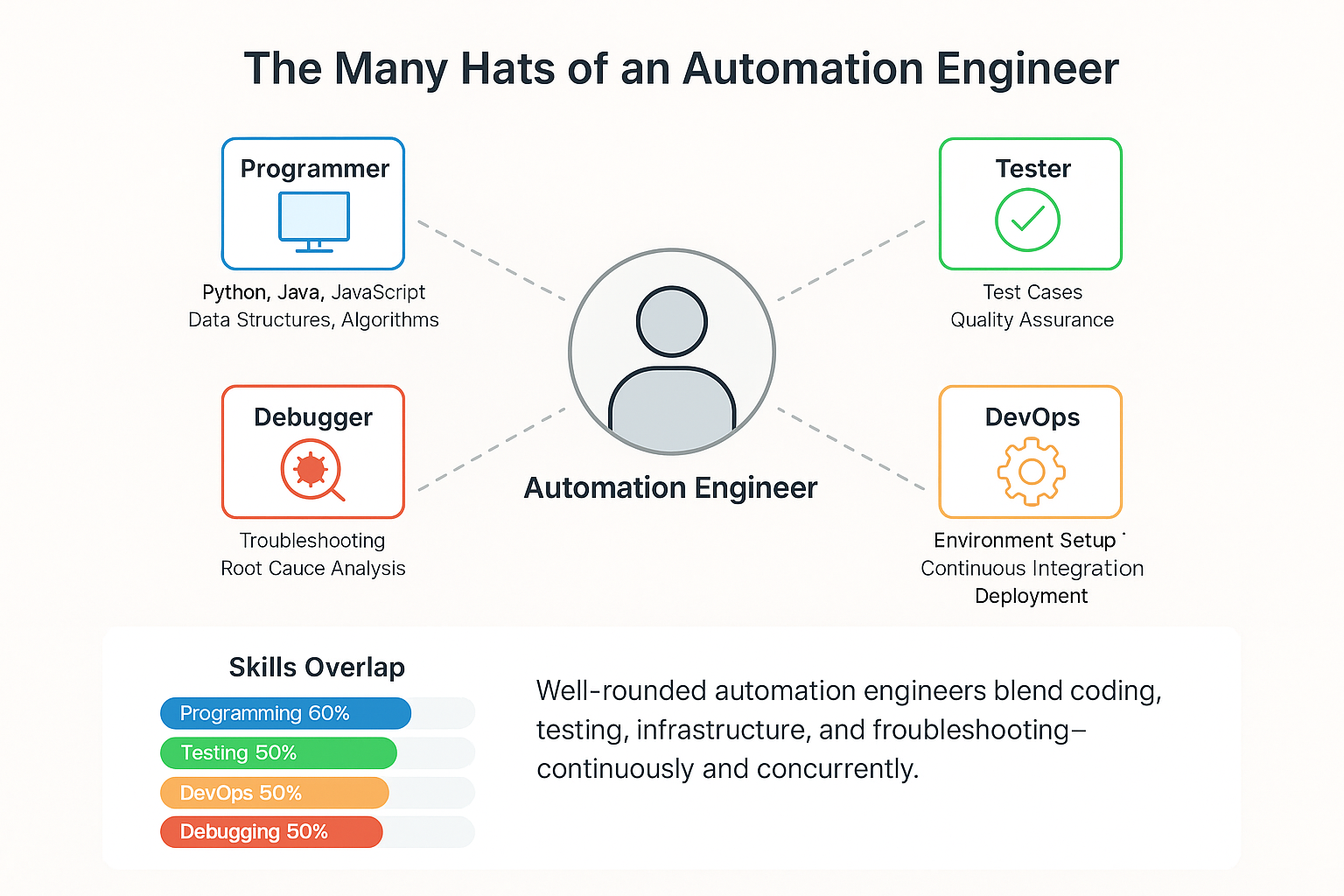
When Automation Isn't for You
Don't do this if you:
- Hate debugging - You'll spend 30-40% of your time figuring out why things broke
- Want predictable daily tasks - Every day brings new, weird problems to solve
- Prefer working alone - You'll constantly collaborate with developers, product managers, engineering leads, engineering managers and other testers
- Just want easy money - The high salaries come with real responsibility and stress
Red flag: If you're only attracted to the salary but find programming tedious, you'll burn out fast.
Avoiding Burnout (From Someone Who's Been There)
The biggest burnout factor? Feeling like you're constantly playing catch-up with breaking tests instead of adding real value.
What actually works:
- Set boundaries - Don't be the person who fixes every flaky test at 11 PM
- Automate your automation - Use tools that auto-heal minor test failures
- Focus on high-impact tests - Not everything needs to be automated
- Build relationships - Good communication with engineering leads prevents most test-breaking changes
Pro tip: The most successful automation engineers I know treat test maintenance like a product, not a chore. They invest in making their frameworks robust upfront rather than constantly firefighting.
Your Future in Test Automation Depends on What Drives You
Test automation isn’t a shortcut or a fallback; it’s a serious career with serious upside if you’re in it for the right reasons. The demand is strong, the pay is competitive, and the skill set stays relevant.
But it also takes real commitment, curiosity, and a mindset for long-term growth. If you're just chasing a title, it won't hold up. But if you're here to build, it absolutely will.
Want more straight-shooting career insights and technical growth strategies that actually move the needle? Subscribe below and stay one step ahead.
✉️ Get free system design pdf resource and interview tips weekly
✉️ Get free system design pdf resource and interview tips weekly

